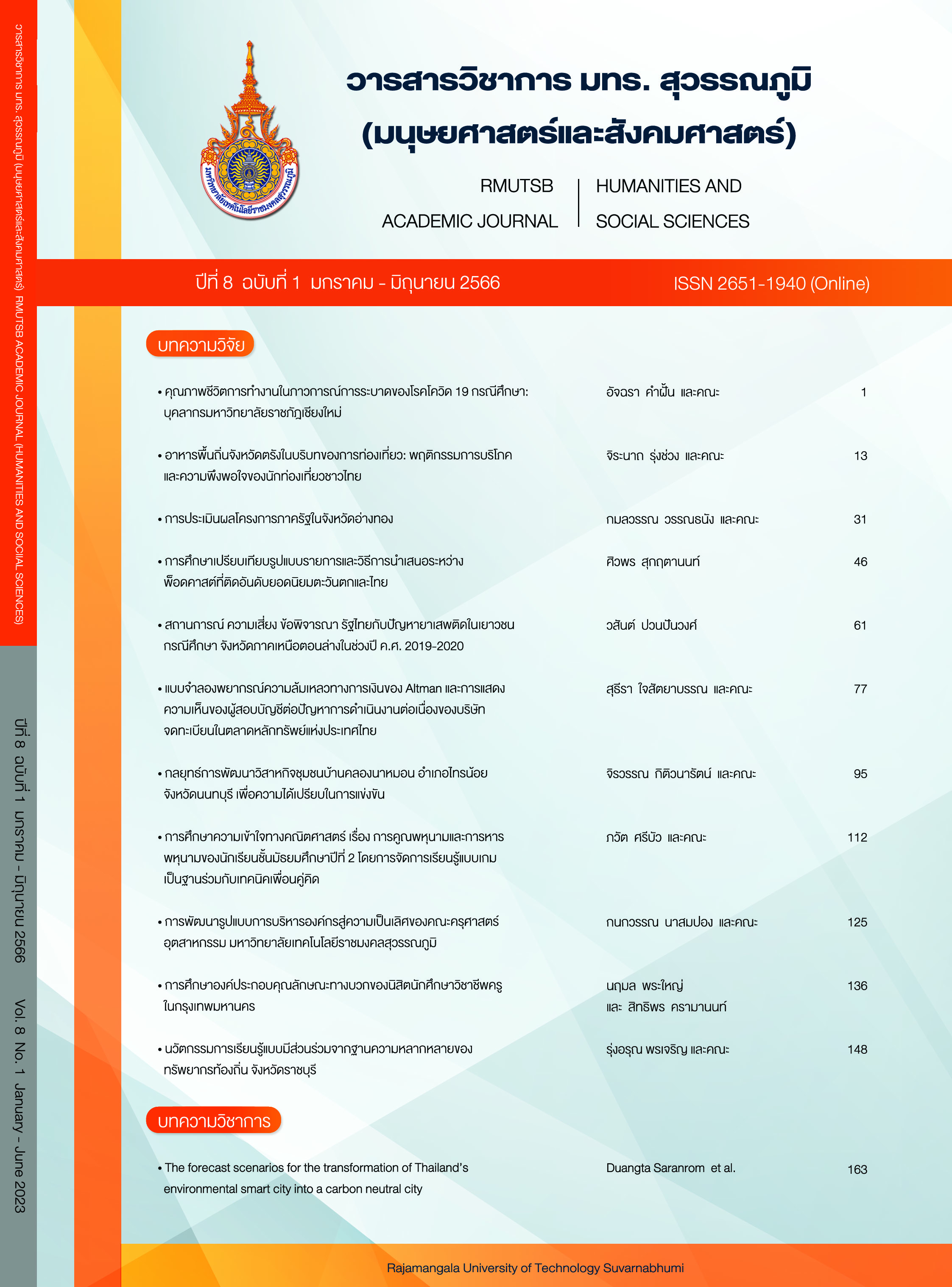Quality of work life during COVID-19 pandemic: Case study personnel of Chiangmai Rajabhat University
Main Article Content
Abstract
This integrated research aimed to study the quality of work life during the COVID-19 outbreak, to predict factors influencing the quality of work life, and to synthesis guidelines for enhancing the quality of working life during the epidemic of COVID-19. The key informants were 250 personnel working at Chiang Mai Rajabhat University and 7 other stakeholders. The data were collected through questionnaires, informal interviews, and focus group discussions. Descriptive statistics, multiple linear regression, and content analysis were used to interpret the results
The results indicated that the quality of working life during the COVID-19 pandemic among personnel working at Chiang Mai Rajabhat University overall is low (mean=2.35±0.65). Two variables could explain variations in the quality of working life, which are satisfaction with measures and University operation guideline on COVID-19 prevention (Beta=-0.22, p=0.00) and participation in a group outdoor activity with friends negatively affecting the quality of working life (Beta=-0.03, p=0.02). Together, they predict the quality of working life at 24.80% with statistical significance (p=0.05). In this regard, the stakeholders have suggested policies on improving the quality of work-life with guidelines for enhancing the quality of work-life in the time of the COVID-19 epidemic through online public relations, supporting personal protective equipment, and developing a work-from-home support system
Article Details

This work is licensed under a Creative Commons Attribution-NonCommercial-NoDerivatives 4.0 International License.
References
Butsankom, T. (2012). Selection of predictive variables into multiple regression equations. Journal of Educational Measurement. Mahasarakham University, 17, 55-56.
Chankana, T., Thaiarry, P., & Wongthongdee, S. (2021). Quality of life of government personnel affected by COVID-19 epidemic situation: Case study rights and liberties protection department. Thai Research and Management Journal, 2(3), 16-45.
Cronbach, L. J. (1951). Coefficient alpha and the internal structure of tests. Psychometrika, 16, 297-334.
Daniel, W. W. (2010). Biostatistics: basic concepts and methodology for the health sciences (9th ed.). New York: John Wiley & Sons.
Department of Mental Health. (2020). Mental rehabilitation plan in the situation of the Korona virus epidemic 2019 (COVID-19) (Combat 4th Wave of COVID Plan: C4). Bangkok: Beyond.
Haber, D. (2003). Health promotion and aging (3rd ed.). New York: Springer.
Inter-Agency Standing Committee. (2020). Addressing mental health and psychosocial aspects of COVID-19 outbreak (interim briefing note). Geneva: IASC.
Insel, P. M., & Moos, R. H. (1974). Psychological environments: Expanding the scope of human ecology. American Psychologist, 29(3), 179-188.
Institute for the Promotion of Occupational Safety, Health and Work Environment. (2020). Quality of working life. Bangkok: Institute for the Promotion of Occupational Safety, Health and Working Environment (Public Organization).
Joshi, A., Kale, S., Chandel, S., & Pal, D. K. (2015). Likert scale: explored and explained. British Journal of Applied Science & Technology, 7(4), 396-403.
Kaewnil, T. (2015). Quality of work life, ethical working of personnel working at Chiangmai Rajabhat University and public policy. Chiangmai: Chiangmai Rajabhat University.
Matthew, B. M., & Michael, A. H. (1994). Qualitative data analysis: An expanded sourcebook (2nd ed.). California: SAGE.
Ravi, P. R. (2020). COVID-19 and mental health: A review of the existing literature. Asian Journal of Psychiatry, 52, 102066.
Serafini, G, Parmigiani, B., Amerio, A., Aguglia, A., Sher, L., & Amore, M. (2020). The psychological impact of COVID-19 on the mental health in the general population. QJM: An International Journal of Medicine, 113(8), 531-537.
Srisa-ard, B. (2018). Principles of preliminary research. Bangkok: Suwiriyasas.
Tossawut, T., & Mahiwan, P. (2020). The development of social quality of life of people and the prevention of the spreading of coronavirus infectious disease (COVID-19). Journal of MCU Nakhondhat, 7(9), 40-55.
Walton, R. E. (1974). Improving the quality of work life. Harvard Business review, 4(7), 12-14.
Wongwassana, S. (2021). Negative influential factors from COVID-19 pandemic on passenger service’s happiness in work: A case study of Bangkok flight services (BFS). Rajapark Journal, 15(39), 15-30.
Zafrul, A., & Abdul, R. S. (2020). A study on quality of work life amongst employees working in the Kingdom of Saudi Arabia. Management Science, Letters, 10(2020), 1287-1294.


